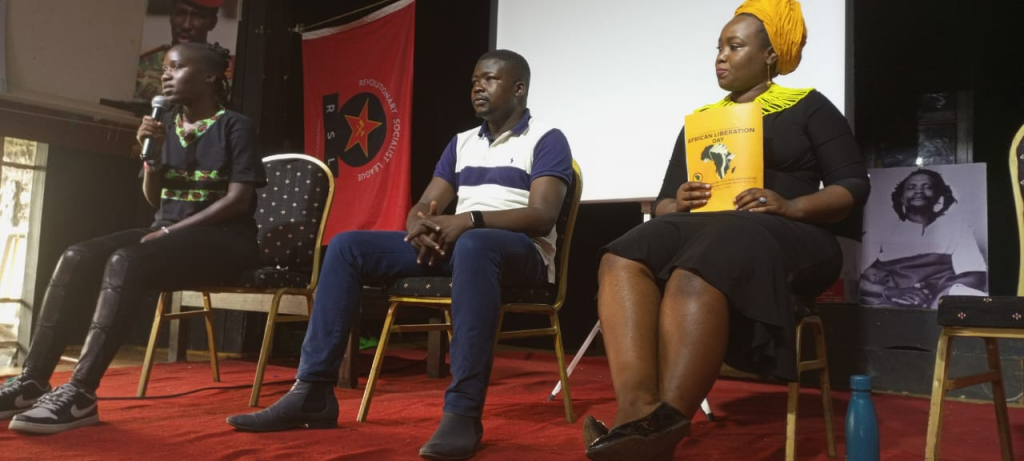Kwame Nkrumah fue anfitrión de la Primera Conferencia de Repúblicas Africanas Independientes en Accra, Ghana, en 1958, a la que asistieron ocho repúblicas africanas independientes. El 15 de abril fue designado como el «Día de la Libertad de África», para conmemorar el desarrollo continuo de la lucha por la liberación y expresar el deseo del pueblo africano de liberarse del dominio y la explotación extranjeros.
El 25 de mayo de 1963, treinta y un jefes de Estado africanos se reunieron en una conferencia cumbre para establecer la Organización de la Unidad Africana (OUA). Cambiaron el nombre del Día de la Libertad de África a «Día de la Liberación Africana» y trasladaron la fecha al 25 de mayo.
Este jueves 25, la Liga Socialista Revolucionaria, junto con otras organizaciones panafricanistas, realizaron un evento para conmemorar la fecha. El tema principal que sustenta la celebración del día sigue siendo la libertad y la liberación de África; libertad de las ataduras políticas de las potencias imperialistas del Norte Global y liberación de la esclavitud económica de los capitalistas monopolistas internacionales.
Hubo un aluvión de actividades que incluyeron proyecciones de documentales, entretenimiento de artistas y paneles de discusión. Los panelistas del día fueron Ezra Otieno de la Liga Socialista Revolucionaria, Sefu Sani del Partido Comunista de Kenia y Faizal Ahmed, un periodista de Sudán.
Estas son las resoluciones del evento:
La Liga Socialista Revolucionaria expresa su solidaridad con el pueblo sudanés en su continua revolución contra la clase reaccionaria. Reconocemos su batalla por la justicia social, la igualdad y la emancipación sudanesa. Decidimos trabajar juntos y compartir nuestras experiencias para promover la causa del pueblo trabajador africano y la lucha revolucionaria.
Nuestra tarea en 2023 es garantizar que los africanos de todo el mundo comprendan la amenaza que el imperialismo y el neocolonialismo representan para nuestros esfuerzos por lograr la liberación. ¿Qué hay que hacer entonces? El plan se encuentra en el objetivo panafricanista del Partido Revolucionario del Pueblo Africano. Ese objetivo es la liberación total y la unificación de África bajo el socialismo científico. Consideremos por qué este es un enfoque efectivo.

Socialismo científico
El socialismo científico debe guiar y gobernar la economía de África. Muchos africanos no solo no incluyen el socialismo científico como parte de su agenda, sino que ni siquiera saben qué es. Realmente no es tan complicado como parece. Cualquier país siempre se enfrenta a una pregunta básica: «¿Cómo vamos a lidiar con el dinero y los recursos de la nación?» Si quienes responden a la pregunta creen en un enfoque capitalista de la economía, dirán: “Pongamos la riqueza de la nación en manos de un pequeño grupo de élite. Este grupo puede determinar si las amplias masas de personas compartirán esta riqueza y, de ser así, en qué medida”. África ya ha tenido muchos años de experiencia con el capitalismo y los resultados no han sido buenos.
Entre otras cosas, el capitalismo introdujo a África el comercio de esclavos, el colonialismo, la pobreza generalizada, los desastres ambientales, las guerras, el saqueo extranjero y la explotación de los recursos naturales, la corrupción y las enfermedades. Hay otro camino que África debe seguir. Es el camino socialista. Un socialista dirá: “Pongamos la riqueza de la nación en manos de todos. Esto asegurará que las decisiones sobre qué hacer con él siempre sean en el mejor interés de las amplias masas del pueblo. Las personas mismas nunca tomarán decisiones a propósito que las perjudiquen a sí mismas”. ¿Por qué, por ejemplo, la gente decidiría alguna vez permitir que corporaciones extranjeras entren en África para robar su petróleo y los minerales más valiosos? El socialismo simplemente tiene sentido. Es un enfoque científico de la economía porque se basa en consideraciones prácticas y concretas en lugar de nociones teóricas y románticas sobre cómo se debe manejar el dinero y los recursos.
Sigamos el Camino Panafricano
Por lo tanto, debe quedar claro que el panafricanismo, la liberación total y la unificación de África bajo el socialismo científico, es el objetivo que deben perseguir los africanos de todo el mundo. Para aquellos que concluyen que el panafricanismo es el objetivo correcto, es necesario asegurarse de que, a medida que se hagan esfuerzos para lograrlo, esos esfuerzos estén debidamente dirigidos y sean efectivos. No hay mejor manera de hacerlo que organizando un partido político comprometido con el logro del panafricanismo.




